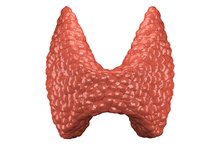Side Effects of Hypothyroidism
Hypothyroidism is a medical condition that occurs if your thyroid--a small gland within your neck that is part of your endocrine system--produces abnormally low levels of thyroid hormones 1. These thyroid hormones are responsible for regulating your metabolism, or how your body uses energy. About 5 percent of people in the United States have this condition and the majority of them are women, based on estimates from the National Endocrine and Metabolic Diseases Information Service 3. An insufficient supply of thyroid hormones within your body can cause a number of side effects, all of which should be discussed with your doctor.
Weight Gain
Weight gain is one of the primary side effects associated with hypothyroidism. Low levels of thyroid hormones within the body slow the metabolism of ingested food sources. This causes a decrease in the rate at which your body burns calories, which causes weight gain. This condition can also cause fluid retention, which can lead to swelling of facial tissue or body muscles. If you have hypothyroidism, you can develop an increase in body weight even if your diet remains unaltered.
- Weight gain is one of the primary side effects associated with hypothyroidism.
- This causes a decrease in the rate at which your body burns calories, which causes weight gain.
Fatigue
Hypothyroid Signs and Symptoms in Women
Learn More
Low levels of thyroid hormones can contribute to extreme tiredness or fatigue. A slower metabolism also decreases how quickly your cells obtain energy from ingested food, which can lead to chronic fatigue.
Constipation
Hypothyroidism can cause changes in bowel movements. Low thyroid hormone levels can make it difficult or impossible for you to produce a stool--a condition known as constipation. Constipation can cause additional symptoms, such as abdominal cramping, pain or bloating, and may contribute to weight gain. If this condition does not resolve, speak with a doctor for further care.
- Hypothyroidism can cause changes in bowel movements.
- Constipation can cause additional symptoms, such as abdominal cramping, pain or bloating, and may contribute to weight gain.
Hair Loss
What Are the Causes of Fluctuating Thyroid Levels?
Learn More
Decreased thyroid hormone levels can cause changes in the appearance of your hair. Certain people can develop coarse, dry or dull hair due to this condition. Hair loss, which can occur from the scalp or eyebrows, is also a common side effect of hypothyroidism.
Decreased Heart Rate
Hypothyroidism causes some people to develop a slowed heart rate, the New York Thyroid Center at Columbia University Medical Center warns 1. Such symptoms should be discussed with your doctor as soon as possible.
Dry or Discolored Skin
An underactive thyroid gland can also cause dry or discolored skin. Dry skin can appear red or flaky and may become itchy or irritated. Skin discoloration due to hypothyroidism can cause your skin to appear yellow or orange--especially on the palms of your hands or the soles of your feet.
Vocal Alterations
Abnormally low levels of thyroid hormone can cause enlargement of your thyroid gland--a condition called goiter--which can lead to problems with your voice box. If you have hypothyroidism, your voice may sound dry, raspy or hoarse, making it difficult for you to speak normally.
Cognitive Impairment
Hypothyroidism can cause cognitive difficulties in some people. You may be unable to concentrate during your normal activities, or you may become forgetful or have difficulty making decisions.
Depression
Hypothyroidism can also lead to mood alterations, such as depression or anxiety. A study published in the March 1993 issue of "The American Journal of Psychiatry" reported that 56 percent of subclinical hypothyroidism patients reported experiencing depression at some point during their lives. In contrast, the lifetime frequency of depression was only 20 percent in healthy patients.
Menstrual Cycle Changes
Women with hypothyroidism can develop irregular or abnormally heavy menstrual periods. Some women can also experience miscarriages or may be unable to become pregnant (infertility) because of this condition.
Related Articles
References
- InformedHealth.org. Underactive thyroid: Overview. Updated August 10, 2017.
- Segni M. Disorders of the Thyroid Gland in Infancy, Childhood and Adolescence. In: Feingold KR, Anawalt B, Boyce A, et al., editors. Endotext. Updated March 18, 2017.
- Almandoz JP, Gharib H. Hypothyroidism: etiology, diagnosis, and management. Med Clin North Am. 2012;96(2):203-21. doi:10.1016/j.mcna.2012.01.005
- Biondi B, Wartofsky L. Combination treatment with T4 and T3: toward personalized replacement therapy in hypothyroidism?. J Clin Endocrinol Metab. 2012;97(7):2256-71. doi:10.1210/jc.2011-3399
- Hennessey JV, Espaillat R. Current evidence for the treatment of hypothyroidism with levothyroxine/levotriiodothyronine combination therapy versus levothyroxine monotherapy. Int J Clin Pract. 2018;72(2):e13062. doi:10.1111/ijcp.13062
- Jonklaas J, Bianco AC, Bauer AJ, et al. Guidelines for the treatment of hypothyroidism: prepared by the american thyroid association task force on thyroid hormone replacement. Thyroid. 2014;24(12):1670–1751. doi:10.1089/thy.2014.0028
- Garber J et. al. Clinical Practice Guidelines for Hypothyroidism in Adults: Cosponsored by the American Association of Clinical Endocrinologists and the American Thyroid Association. Endocr Pract. 2012 Nov-Dec;18(6):988-1028.
- American Thyroid Association. (n.d.). Hypothyroidism (Underactive).
- Braverman, L, Cooper D. Werner & Ingbar's The Thyroid, 10th Edition. WLL/Wolters Kluwer; 2012.
- Surks MI. (2017). Clinical manifestations of hypothyroidism. Ross DS, ed. UpToDate. Waltham, MA: UpToDate Inc.
- Sworczak K, Wisniewski P. The role of vitamins in the prevention and treatment of thyroid disorders. Endokrynol Pol. 2011;62(4):340-44.
Writer Bio
Rae Uddin has worked as a freelance writer and editor since 2004. She specializes in scientific journalism and medical and technical writing. Her work has appeared in various online publications. Uddin earned her Master of Science in integrated biomedical sciences with an emphasis in molecular and cellular biochemistry from the University of Kentucky College of Medicine.








